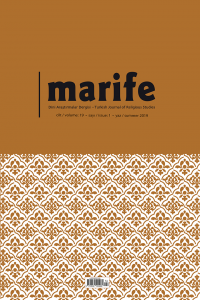
Marife Dini Araştırmalar Dergisi
Yazarlar: Cafer GENÇ
Konular:Din Bilimi
DOI:10.33420/marife.784475
Anahtar Kelimeler:Ilm al-kalÀm,Knowledge,Language,Perception,Magic
Özet: Since the universe is created, it essentially stands as a witness to Allah’s attribute of creativity and power along with His many other attributes. At the same time because it addresses to the perception of conscious beings, it leads to the creation of knowledge. The universe signifies the knowledge of Allah, as it signifies his attributes, and the knowledge of human as it is the humans’ perception. The dual structure of the universe both presents the source and the solution of the problem. The fact that both problem and its solution exist together in the universe creates a paradox for human mind. For a mind that perceives the universe as in the natural/mental process rather than the fact that it is created, the universe is an open phenomenal field and has nothing ambiguous in it. Therefore, such a mind is obliged to perceive the universe as a fully autonomous system. Whilst the mind that perceives the universe as a created entity, because it does not have the “open” conscious like the previous one, may face the danger of perceiving the universe mythically. A mind that only accepts that the universe is created and has no other knowledge on the matter cannot fully leave the mythical understanding. Therefore, seeing the universe both mythical and factual is a feature of the mind. From this point of view, the “anti-religion” understanding of all the materialist formations starting with the enlightenment philosophy seems to be very consistent in and of themselves. The revelation may be a guide to a mind that can understand the fact that the universe is created. It is not possible for it to guide the mind that cannot get passed that threshold. In this context, it is quite interesting that in the Qur’an it is frequently declared that Allah is the creator. The knowledge that Allah is the creator is not merely a knowledge but at the same time and maybe even more importantly a sign that the mind is ready to understand the revelation. This is where the faith occurs theologically. Once the mind is ready to understand the revelation, the “knowledge” phase begins. The knowledge on the formal level that cannot produce the readiness of the mind for the revelation cannot move on to the rational truths in the Qur’an. The objection of those who were the first to receive the call of the prophets, with a common voice, "This is nothing but magic", is nothing but the objection of the "false" open mind. By making the universe an "open" phenomenal field, the human mind can make a mistake that is difficult to get rid of by thinking that the universe will be truly open, and therefore it has to see revelation as the source of the problem. The objection “This is nothing but magic.” cannot be limited to the messengers of the message. This objection has epistemological grounds. The fact the those who objected it at the first place gave up on their objections after they truly understood the revelation shows us that this objection was not merely about will at the first place. Since the objection “This is nothing but magic.” has epistemological grounds, it shows us that this call cannot be understood as its limited formal structure. The call of the prophets to the revelation, to put into today’s words, is related to all the knowledge areas starting with “the philosophy of education”. The call to revelation is not an alternative call but a true, rational call with no alternatives. Similarly, all epistemological domains that are problematic with revelation have the same background in the objection "This is an obvious magic". Those who said "This is obvious magic" said this with the confidence of making a rational determination about the universe and life but Qur’an states that this is not the truth. When magic is considered within the framework of its use in the Quran, apart from its populist meaning, it starts with the history of humanity and continues with the same importance. The distance between the event and perception of it reveals the degree of the magic. The language of magic is not a utopic one, instead it is a language that is rational enough to be in use within the society. When a person does not recognize magic, he falls under the effect of magic, and when he does, he gets rid of it. The mind that thinks the magic is over is the mind that is exposed to magic the most.
Dergi editörleri editör girişini kullanarak sisteme giriş yapabilirler. Editör girişi için tıklayınız.